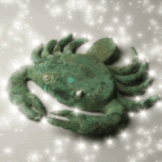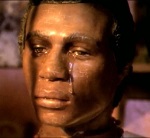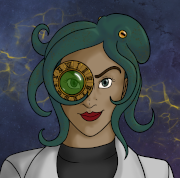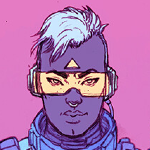|
ravenkult posted:I like this one. It's the only book of the sort that actually made sense to me, even if it's about scriptwriting and not novel writing. http://www.amazon.com/gp/product/00...3VFOF5LXL44S5OF Other books from the reading list (that have actually been useful) : Stephen King, 'On Writing' There was a generation gap in our lecturers between the older ones (who wanted us to write highbrow literary explorations) and the younger ones (who wanted us to leave actually able to write poo poo that would sell). The second group pushed this book hard. Because it's written by a bestselling author, and the second half of it is literally his thoughts on how to write. I know it's been mentioned a lot, but it was on the reading list and was pretty useful. Lajos Egri, 'The Art of Dramatic Writing' Primarily a drama text, it covers a lot about how to really look at characters backgrounds and motivations in terms of making every single entity in a story a fully rounded character. It's pretty good. 'The Creative Writing Course Book', ed. Julia Bell & Pauls Magrs Full of a crapload of springboard exercises for getting ideas moving. Sandra Newman & Howard Mittelmark, 'How Not to Write a Novel' Probably best to keep this one for the editing / self criticism phase. Is basically the books section of TV Tropes, saying which ones are good and which to avoid. Christopher Booker, 'The Seven Basic Plots' This book is an absolute beast, so maybe skip reading the actual thing and just read some study guides / summaries on it instead: http://changingminds.org/disciplines/storytelling/plots/booker_plots/booker_plots.htm http://tvtropes.org/pmwiki/pmwiki.php/Main/TheSevenBasicPlots Strunk & White, 'The Elements of Style' Lynne Truss, 'Eats, Shoots & Leaves' Everyone needs to brush up on grammar & punctuation. Even if you think you don't, there are valuable lessons in here about how to reword sentences to avoid unclear wording. Not on the reading list but highly recommended by a lot of people: Julia Cameron, 'The Artist's Way' A 12 week self-taught program for how to get into a mindset of producing new stuff creatively and thinking like an artist. Most people won't have the time to engage with it, but I have heard good things from everyone who's stuck with it. And obviously more useful for Trad, but the Writers' and Artists' Yearbook was useful enough that our head of course bought us all a copy as graduating gifts. loving expensive though, and they put most of their helpful Q&A advice on the website for free anyway.
|
|
|
|

|
| # ? Apr 25, 2024 12:25 |
|
Bobby Deluxe posted:
I hear The Sense of Style: The Thinking Person’s Guide to Writing in the 21st Century by Steven Pinker (the cognitive scientist, yeah) is really good. quote:Not on the reading list but highly recommended by a lot of people: Julia Cameron, 'The Artist's Way' I really want to like this, but it basically starts with OKAY LET'S ASSUME GOD IS REAL AND MAKES YOU WRITE and goes from there.
|
|
|
|
SurreptitiousMuffin posted:Having a huge backstory is good, but not everything needs to go into the story. It's like an iceberg: only a small portion of the story actually hits the page. The rest goes on between the lines, and if you have all this extra information pre-written it will come across in the story without having to be directly stated. I'm not sure Lord of the Rings is the best example to cite here since it does, in fact, start with a full five chapters of tedious, expository world-building infodump/backstory.
|
|
|
|
Obviously, sticking rigidly to the word counts Save The Cat gives you is silly, but it's really helpful to have the beats of a three-act structure laid out like that. There's nothing wrong with following a structure that's known to work. Not everyone wants to be innovative and trailblazing. I just want to tell coherent stories people will enjoy. Also, my mother had a copy of the The Artist's Way and it's ... it's a bit on the New Age, mindful hippie side but if you can deal with that, it's good. Though I honestly don't think being creative can be taught. You either are or you aren't. painted bird fucked around with this message at 16:45 on Jan 24, 2015 |
|
|
|
I don't like Save the Cat because I think it's a trap. It presents a decent structure and set of rules for telling a story...but if you read around I think most successful stories don't obey them. Save the Cat teaches you how to mimic but not to understand. It's a good way to produce competent structures, but I think the harder road, reading a lot of good poo poo and writing hundreds of thousands of words of awful poo poo, is ultimately more rewarding and powerful. It is, admittedly, a lot harder. I just don't want bookshelves to read the way modern action movies play. I bet everyone here can find a bunch of great stories that completely defy the Cat structure. Pardon my soapbox, though, I know writing isn't the same for everyone. Reading Save the Cat won't hurt you, I just hope you'll move past the formula!
|
|
|
|
I guess my fear is that Save the Cat and similar formulas are how you go from material like 'Alan Turing's life story' to something as ineffectual as The Imitation Game.
|
|
|
|
I don't think structure was the problem with The Imitation Game. The problem with The Imitation Game was making a movie about a prominent gay figure and focusing it on a heterosexual romance he had once. I don't think Save The Cat presents anything more rigid or formulaic than the basic three-act structure. Again, I'm not advocating following it off a cliff, I'm just saying that having a thing that says "you [can] introduce the B plot at the start of Act II" is a helpful reminder for when I'm outlining and I'm stuck on what happens in the middle of the story. painted bird fucked around with this message at 18:23 on Jan 24, 2015 |
|
|
|
General Battuta: I respect that you're a published author and I'm a nobody who hasn't ever finished a project, but I also think you're attributing the shittiness of Hollywood blockbusters to the wrong thing. It isn't a formulaic structure that's the problem, it's the total lack of original ideas draped on the formula.
|
|
|
|
You might be right! I'm not sure I agree, but I won't argue it's often pretty handy to have a skeleton structure to grab and organize your ideas on.
|
|
|
|
yeah, sometimes i literally tell people "well, the movie was ok but pretty formulaic." i have never read a writing book and i refuse to ever read one. :stillnotpublished:
|
|
|
|
I just started writing a short story, and then I realized I was writing "Life on Mars" meets "Interstellar." What do you do when you realize this?
|
|
|
|
Liam Emsa posted:I just started writing a short story, and then I realized I was writing "Life on Mars" meets "Interstellar." Make it the best possible version of 'Life on Mars' meets 'Interstellar' you possibly can.
|
|
|
|
Liam Emsa posted:I just started writing a short story, and then I realized I was writing "Life on Mars" meets "Interstellar." Either keep writing as is, re-evaluate and see if I can change it, or quit writing it and start something new.
|
|
|
|
Everything is derivative, isn't it? I mean that's what I'm trying to come to terms with. I can always describe everything as _____ meets _____, so I shouldn't get discouraged if I start realizing I'm writing something that's similar to something else?
|
|
|
|
Liam Emsa posted:Everything is derivative, isn't it? I mean that's what I'm trying to come to terms with. I can always describe everything as _____ meets _____, so I shouldn't get discouraged if I start realizing I'm writing something that's similar to something else? Try not to get discouraged no matter what. Getting discouraged is going to interfere with your writing far more than writing one story that might be kind of derivative. Yes, everything will be kind of like something else. That isn't an excuse to write stuff that is completely derivative (like fan fiction where you don't really need to build characters or backstory...). But something that reminds you of something else? Probably not a big deal? Only you can decide. Anyway, like General Battuta said, you will probably have to write hundreds of thousands of words of awful poo poo to eventually get pretty good. So you may as well keep going with this story if that's what you want to do. Or quit and start over. Don't let deciding to abandon a story discourage you either. DON'T GET DISCOURAGED. REMEMBER THESE WORDS OF WISDOM: I get knocked down But I get up again You're never gonna keep me down.
|
|
|
|
Pissin the night away....
|
|
|
|
what ever happened to mary?
|
|
|
|
quote:
Pretty perfect song for this gig hth.
|
|
|
|
Liam Emsa posted:Everything is derivative, isn't it? I mean that's what I'm trying to come to terms with. I can always describe everything as _____ meets _____, so I shouldn't get discouraged if I start realizing I'm writing something that's similar to something else? I'm probably the last person in the world who should give advice on anything, but we, as human beings, are nothing more than the sum of our parts. Our writing isn't unique -- the ideas have to come from somewhere. The difference between a bad writer and a good one is a good one can present any idea, no matter how old and overused, and make it fresh and new again. Tolkien took fairy tales and mythology and practically invented a genre, and literally hundreds of authors have written literally thousands of novels that are essentially Lord of the Rings, and a lot of them are actually really good despite being thinly veiled derivatives. Don't focus on being unique, focus on writing what you love, and then work on it from there. also something something thunderdome something something
|
|
|
|
Screaming Idiot posted:are nothing more than the sum of our parts I would like to challenge this premise.
|
|
|
|
Yeah what the gently caress
|
|
|
|
I'll take your side on this so long as we establish that I have all the good parts.
|
|
|
|
But it's true, isn't it? Even the most outrageous, mind-blowing novels out there are essentially retellings of older tales. We are products of our culture, a shuffling of artificial memes and base instincts combined to make a whole. There's no such thing as a truly unique story. No such thing as a truly unique person. The way a story is told can make it remarkable, and the things a person does can be remarkable, but unless a person suddenly explodes into a cloud of sentient unknowable color that alters the space-time continuum as we know it, he's not really unique. Too many people try to be different, wrack their brains to create something utterly new, and either make more of the same and get angry for being called out on it, or they give up and assume they'll never get better. Their mistake is in thinking that uniqueness can be quantified -- it can't be. It's not something you can aspire to. It's an outlier, an accident, a happy anomaly. We're human beings. We breathe, we eat, we poo poo, we gently caress, we fight -- in the end, that's what our stories boil down to, whether it's Isaac Asimov's treading into transhumanism to Richard Knaak's poo poo about immortal elves. All stories are examinations of humanity. We are the sum of our parts. Nothing more. A good new story and a good old story have the same base elements; it's how they're combined that makes or breaks the story, whether or not it can draw in the reader. We're human beings, and we're writing for human beings.
|
|
|
|
If I put you into a vacuum and turn up the pressure, I haven't changed your "parts" at all, but surely have changed your attitude a bit. Our "parts" are atoms and molecules, what we are is much greater than just a bucket of parts. If you want to talk about a story, it's the same. The parts of the stories are the words and ideas, but the way they're put together matters a whole lot. You can take two ideas that have been done before, and put them together in a new way that makes people think/feel things they haven't felt before. Have their eyes seen any new parts? No, but they've experienced something more.
|
|
|
|
Screaming Idiot posted:We're human beings. We breathe, we eat, we poo poo, we gently caress, we fight People be lizards. But yeah don't worry too much about originality as long as you don't go directly ripping things off plot beat per plot beat and name your character Fromo who is a Mobbit looking for the Two Keychain. It's more in how it's written and later you can worry about that and change things if it is too similar to something.
|
|
|
|
Screaming Idiot posted:But it's true, isn't it? Even the most outrageous, mind-blowing novels out there are essentially retellings of older tales. We are products of our culture, a shuffling of artificial memes and base instincts combined to make a whole. I...guess this is true, in a loose tautological sense, and it's certainly something you hear repeated a lot in discussions of storytelling, but is it meaningful in any way? Stories are all similar, except in the ways that they're different. People share most of their genetic and environmental information, except for the variables that change. History's big and has a lot of inertia and individuals can't make much of a difference, except occasionally when they do. We pick this book up and we love it. We pick that book up and we loathe it. We think about the differences, why one story succeeded for us and another failed, and we find them meaningful — we don't shrug and say 'well, they're all basically recursions of primal ur-stories!' You make a fair point that it's not worth fussing over making something completely incomparable to all other art, but is that really a problem anyone has? I don't particularly think that 'all stories are retelling of older stories' is a useful statement. It's true if you zoom out enough, but it's also like walking into a chemistry lab and saying 'all matter is made of nucleons and electrons' and then acting like this is useful insight into making pharmaceuticals or explosives. It turns out that the fine distinctions make a tremendous difference in effect. e: I just grabbed the nearest book at hand, Bolano's 2666, and frankly I'm struggling to figure out what older story it's a retelling of, even in a loose sense. I suppose you could break down the character threads and fit them into loose archetypes? It's a story about people whose actions are motivated by intellectual and emotional desires in a social and historical context, I guess that makes it like most other fiction...? General Battuta fucked around with this message at 05:52 on Jan 26, 2015 |
|
|
|
crabrock posted:If I put you into a vacuum and turn up the pressure, I haven't changed your "parts" at all, but surely have changed your attitude a bit. Our "parts" are atoms and molecules, what we are is much greater than just a bucket of parts. If you want to talk about a story, it's the same. The parts of the stories are the words and ideas, but the way they're put together matters a whole lot. You can take two ideas that have been done before, and put them together in a new way that makes people think/feel things they haven't felt before. Have their eyes seen any new parts? No, but they've experienced something more. That's what I was getting at, in my own roundabout pretentious way. People worry far too much about whether or not they're unique and not enough about whether they'd done anything of worth. I could write a story about a man who masturbates into a volcano and summons a non-Euclidean astrocube that sings in colors; yeah, it'd be "unique," but I doubt very much it'd be a good story. Similarly, I could write a story about a man who falls in love with a girl and would do anything to win her heart; yeah, it's a tale as old as time, a tune as old as song, but it's far more likely to grab the reader and make them invested with the story as a whole. General Battuta posted:I...guess this is true, in a loose tautological sense, and it's certainly something you hear repeated a lot in discussions of storytelling, but is it meaningful in any way? Stories are all similar, except in the ways that they're different. People share most of their genetic and environmental information, except for the variables that change. History's big and has a lot of inertia and individuals can't make much of a difference, except occasionally when they do. All stories have some things in common -- conflict, change, progression. A story is a chronicle of change, and change is usually motivated by one or more of our base desires, or a need that must be met. Not every story is a 1:1 retelling of an ur-story, but every aspect of every story comes from somewhere -- usually older stories. A character's mannerisms, a certain description, a plot twist, etc., everything comes from somewhere. Echo Cian posted:People be lizards. Yeah, pretty much. And hey, we really are lizards -- we're doing everything animals do, we just have millions of years of evolution and hundreds of thousands of years of preparations and past innovations to rely upon. But those innovations are just roundabout ways of procuring means to propagate our genes. We can fly planes, write sonnets, and wear sneakers with lights in the heels, but we still poo poo and scratch our balls* when all's said and done. *Substitute your itchy sex organ of choice, of course.
|
|
|
|
Screaming Idiot posted:... nothing more than the sum of our parts. Gestalt theory. Look it up, Idiot.
|
|
|
|
Screaming Idiot posted:All stories have some things in common -- conflict, change, progression. A story is a chronicle of change, and change is usually motivated by one or more of our base desires, or a need that must be met. Not every story is a 1:1 retelling of an ur-story, but every aspect of every story comes from somewhere -- usually older stories. A character's mannerisms, a certain description, a plot twist, etc., everything comes from somewhere. You're repeating yourself. As I said above, I think this is basically meaningless. It's like saying that the universe operates on causal principles. Yes — self-evidently. It's a blank, tautological statement. You are arguing: Stories have similarities and differences. Often a story is driven by a motivation. Stories are made out of material drawn from human experience. This tells us nothing useful about how to execute a story well, or why two stories might deploy similar elements and yet strike us very differently. Say this story and that story are both about a man brought low by his own hubris — why do we love this one, and laugh at that one? Why is this one affecting and that one pretentious? 'There are no new stories' is a lazy cop-out. We meet incredible new stories every day. We read nonfiction we can't believe, poo poo that's so crazy we couldn't make it up. We pick up a science magazine and something there fundamentally alters our worldview. We hear a simple premise that's so compelling we can't believe we didn't think of it ourselves. We watch yet another LA crime movie and somehow even though it's set in the same place and it's about the same desperate kinds of people it's preoccupied with different things and leaves us full of different thoughts and feelings. We pick up a science fiction novel that digests cognitive psychology into a terse nihilistic verdict on the nature of consciousness that couldn't have been empirically supported even a few years earlier. quote:Yeah, pretty much. And hey, we really are lizards -- we're doing everything animals do, we just have millions of years of evolution and hundreds of thousands of years of preparations and past innovations to rely upon. But those innovations are just roundabout ways of procuring means to propagate our genes. We can fly planes, write sonnets, and wear sneakers with lights in the heels, but we still poo poo and scratch our balls* when all's said and done. This is equally meaningless. All organisms are biological machines armed with a range of reflexive behaviors and limited cognitive capability. But the differences, in practice, are tremendous, fascinating, and consequential. When someone tells me that all stories are retellings of the same basic ur-myths about the common human experience, I wait for them to realize that this is absolutely useless in figuring out how to tell good stories instead of bad ones. Sugar and PETN are both just different arrangements of the same basic components — a few protons, a few neutrons, a few electrons, just rearranged in different patterns and quantities. But their practical effects couldn't be more different. If you want to understand why, you're not going to get anywhere by insisting it's all just carbon, hydrogen, oxygen, and nitrogen. General Battuta fucked around with this message at 07:17 on Jan 26, 2015 |
|
|
|
while this thread is often used inappropriately to joke around, im wondering if its worthwhile to critique human nature rather than writing itt
|
|
|
|
Well you see, when the first caveman drew a painting of people hunting wild boars, he basically wrote every single story worth telling in the world for time and infinity.
|
|
|
|
I'm sorry about any fallacious arguments or circuitous logic used when explaining my point -- I have a bad habit of taking a simple statement and stretching it out with as much bullshit as I can. It's been a long time since I've gotten a chance to talk about anything academic and what little I know is either rusty or straight-up forgotten. I think I should ask this instead: Why do certain stories appeal to you? What do they have in common? Do others feel the same way? Can you incorporate those aspects into your own work? I've always found the best approach is to write the kind of story you would like to read.
|
|
|
|
I like reading stories where the author, through choices of brief words and execution of precise language, delivers layers of meaning without sacrificing the intent.
|
|
|
|
I think you will find all books are the same, essentially, as they are all composed of the letters a to z 
|
|
|
|
You fool, nobody has ever used the letter Z.
|
|
|
|
The Saddest Rhino posted:I like reading stories where the author, through choices of brief words and execution of precise language, delivers layers of meaning without sacrificing the intent. i like pizza
|
|
|
|
LOU BEGAS MUSTACHE posted:i like pizza me2
|
|
|
|
curse you for proving me wrong LOU BEGAS MSTACHE curse you
|
|
|
|
pizza is a to z backwards with a little leftover 
|
|
|
|

|
| # ? Apr 25, 2024 12:25 |
|
https://www.youtube.com/watch?v=EIN4tC5Zwx0
|
|
|





















